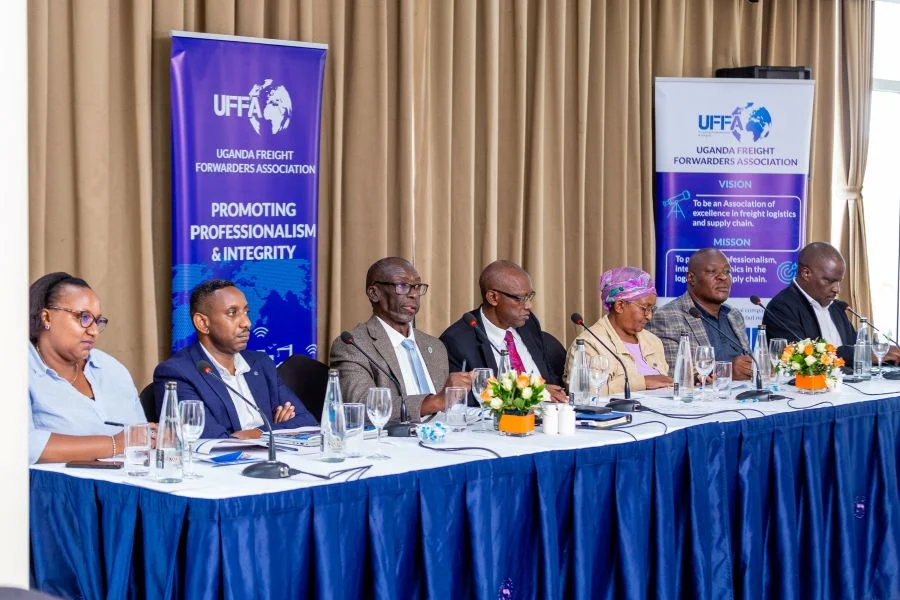Ugandans in the freight logistics sector have said the ongoing impasse in South Sudan between President Salva Kiir and his first vice president, Dr.Riek Machar has affected their business.
Speaking during their 23rd annual general meeting held at Sheraton Hotel Kampala, the chairman of the Uganda Freight Forwarders Association (UFFA) Charles Mwebembezi, said business has stalled as many of their clients cant access the country.
“The conflict in South Sudan has started affecting us. Many of our clients transport cargo to South Sudan but of late it is not easy to access the country. This of course affects their earnings; which also affects the earnings of the UFFA members who were facilitating this cargo movement,” Mwebembezi said.
South Sudan is said to be on the brink of another war after the multiparty unity government was shaken by the arrest of several leaders from the main opposition party, the Sudan People’s Liberation Movement-in-Opposition (SPLM-IO).
The arrests led to intense fighting in recent weeks in the strategic northern town of Nasir between national forces and the White Army militia, a loosely-organised group mostly comprising armed Nuer, Machar’s ethnic group.
The fear of a blown-out war in Juba saw Uganda deploy its military there with an eye on keeping the peace while securing investments made by Kampala.
Speaking during the Uganda Freight Forwarders Association annual general meeting in Kampala, their chairman expressed fear that escalation would see more of their members loses business.
“About two months ago, I visited S. Sudan to inaugurate the board of their freight forwarders association; but by then things were okay. But now I receive numerous calls of traders complaining that their cargo has disappeared in S. Sudan. So it affects the revenues to traders, UFFA members and Uganda as well,” Mwebembezi said.
Revolutionizing industry
The 23rd annual general meeting resolved to revolutionalise the industry through training and capacity building for UFFA members.
“UFFA recognizes that developing human capital is essential for professionalizing the freight logistics sector. To this end, UFFA will administer comprehensive training programs aimed at equipping industry professionals with the necessary skills, knowledge, and competencies in freight forwarding, customs regulations, supply chain management, and digital logistics,” UFFA chairman, Charles Mwebembezi said.
He mentioned programs such as the International Federation of Freight Forwarders Associations, Diploma (FIATA Diploma) and Continuing Professional Development (CPDs) that will focus on emerging trends like digital freight platforms, automation, blockchain applications in supply chains, and the use of artificial intelligence (AI) in global supply chains.
“ The association intends to establish partnerships with more international training institutions and professional bodies to align local training standards with global best practices.”
According to Mwebembezi, in order to enhance accountability and professionalism within the industry, UFFA is working closely with Ministry of Works & Transport, Uganda Revenue Authority (URA), Private Sector Foundation Uganda and several other stakeholders to develop a National Logistics Industry Legal Framework in Uganda.
This, he said will introduce a code of conduct for all members to promote ethical business practices, develop industry-wide service standards to enhance transparency and improve service delivery but also establish a disciplinary committee to handle complaints and disputes within the industry.
Mwebembezi also mentioned enhanced collaboration with regulators, adoption of technology and digital transformation among the key items on their agenda.
Hussein Kiddedde, a member of the UFFA Advisory Council underscored the role of freight logistics industry in the development of the country.
“The freight logistics industry is a strong pillar in the economy. Part of what we do is customs clearance – which involves collection of taxes, where we work as agents for Uganda Revenue Authority (URA). As UFFA, we contribute over 80% of the freight logistics movements in the country. So we are a significant force to reckon with,” Kiddedde said.
James Malinzi, the assistant commissioner in charge of risk management in the customs departs at Uganda Revenue Authority hailed the freight logistics sector for playing a crucial role in revenue collection.
“No customs collection can be done without the involvement of freight and forwarding. They are contributing around 35% to the collection of URA’s national tax targets in general. The other 65% is largely domestic tax related,” Malinzi said.


1 comment
Sad. This is affecting the revenues to traders, UFFA members and Uganda as well.